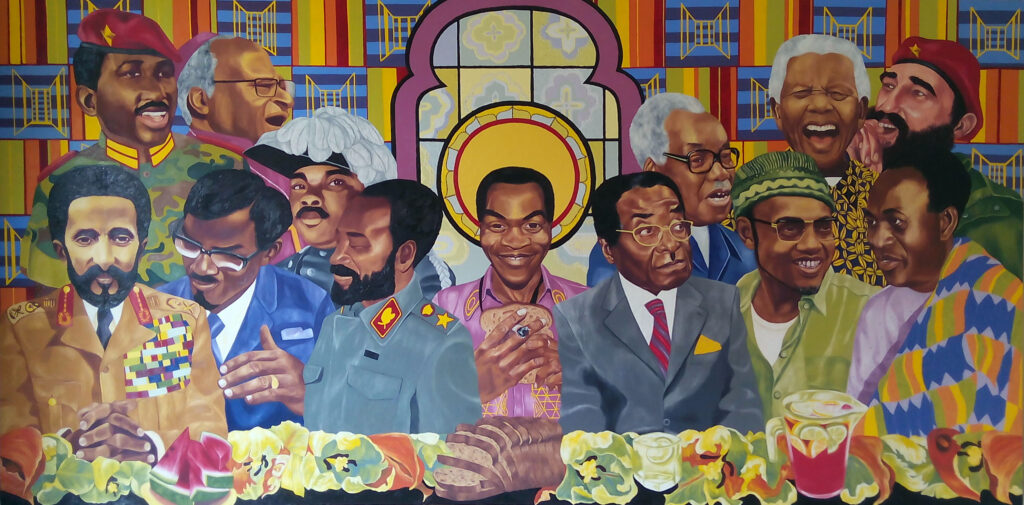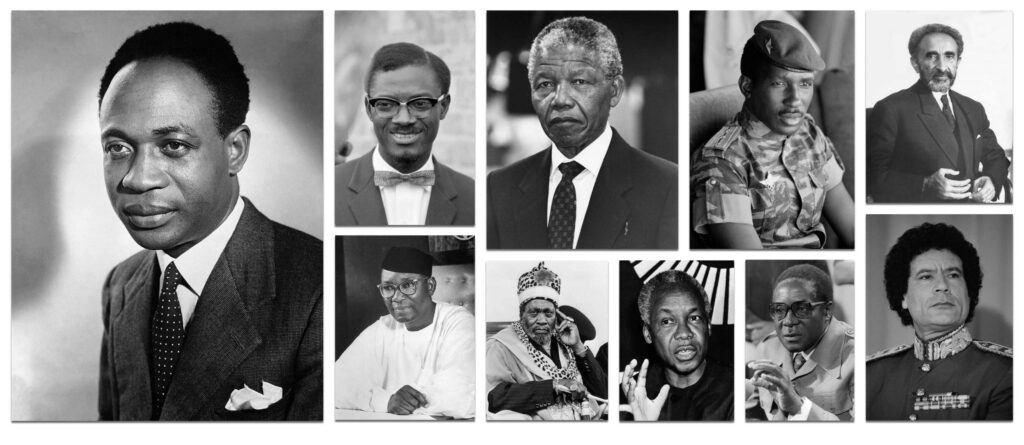
Pan-Africanism can be traced back to the struggles of African people against enslavement and colonization, dating as far back as the first resistance on slave ships in the form of rebellions and suicides. This sense of shared identity and the need to combat racial oppression laid the foundations for the Pan-African movement. In the late 19th century, key figures such as Olaudah Equiano, Ottobah Cugoano, Edward Wilmot Blyden, and James Africanus Beale Horton began articulating the ideas of African unity, nationalism, and self-governance amidst growing European colonialism. This new generation of Pan-Africanists, including J.E. Casely Hayford and Martin Robison Delany, further developed the call for political and economic gains, as well as a return to Africa, either physically or through an Africanized ideology.

Key Figures and Contributions
Several prominent leaders have played pivotal roles in shaping and advancing the Pan-African movement over the decades:
- W.E.B. Du Bois: A writer and activist, Du Bois is credited with coining the term “Pan-Africanism” and organizing a series of influential Pan-African Congresses in the early 20th century. He was instrumental in raising international awareness of Africa and advocating for racial equality globally.
- Marcus Garvey: A political leader and journalist, Garvey founded the Universal Negro Improvement Association (UNIA) in 1914, which preached messages of racial pride and African unity. His famous slogan “Africa for the Africans” exemplified the Pan-African call for self-determination.
- Malcolm X: A minister and activist, Malcolm X was a devout Pan-Africanist who believed in the upliftment of African Americans. He was a key figure in the Nation of Islam and later established the Muslim Mosque, Inc. and the Organization of Afro-American Unity (OAAU) to promote social change.
- John B. Russwurm: An abolitionist and co-founder of the first African American-owned newspaper, Freedom’s Journal, Russwurm advocated for the end of enslavement and the repatriation of African Americans to Africa.

Pan-Africanism and the African Diaspora
Pan-Africanism has had a significant impact on African diaspora communities in the Americas and Europe, influencing Black political movements, fostering solidarity, and maintaining cultural connections.
The concept of the African diaspora, as distinct from continental Africans, has been an integral part of the Pan-African movement. Clair Drake, a prominent scholar, viewed the African diaspora as operating in the “cultural sector” of Pan-Africanism, working to “maintain and reinforce” a shared identity and interests among peoples of African descent worldwide.
Institutionalization and Intergovernmental Efforts
Pan-Africanism as an intergovernmental movement was formally launched in 1958 with the First Conference of Independent African States in Accra, Ghana. As more African countries gained independence, various regional and continental organizations emerged, such as the Union of African States, the African States of the Casablanca Charter, and the Organization of African Unity (OAU), which later evolved into the African Union (AU). The OAU, founded in 1963, became the most influential Pan-Africanist organization, committed to promoting unity, cooperation, and the end of colonialism across the African continent. The establishment of the AU in 2001, modeled after the European Union, was a significant milestone in the institutionalization of Pan-Africanism, aiming to further strengthen economic, social, and political integration among African nations.
Challenges and Constraints
Despite its long-standing legacy and renewed relevance, Pan-Africanism faces various challenges and constraints in the modern context. These include:
- Divergent interpretations and priorities among Pan-Africanist groups, leading to fragmentation and discord
- Tensions between national interests and the pursuit of continental unity
- The persistence of neocolonialism and external interference in African affairs
- The need to adapt Pan-Africanist ideas to contemporary global realities and emerging issues
Challenges and Constraints Faced by Pan-Africanism in the Modern Context
Pan-Africanism, despite its long-standing legacy and renewed relevance, has faced various challenges and constraints in the modern context:
- Divergent Interpretations and Priorities: There are diverse interpretations and priorities among different Pan-Africanist groups, leading to fragmentation and discord within the movement.
- Tensions between National Interests and Continental Unity: There are ongoing tensions between individual African nations’ interests and the pursuit of broader continental unity, which can hinder the realization of Pan-Africanist goals.
- Persistence of Neocolonialism and External Interference: The continued presence of neocolonial structures and external interference in African affairs poses significant obstacles to the self-determination and empowerment of African nations and the African diaspora.
- Need to Adapt to Contemporary Global Realities: Pan-Africanism must adapt its ideas and strategies to address emerging global issues and realities, such as globalization, technological advancements, and changing geopolitical dynamics.
- Fragmentation and Lack of Unified Vision: The lack of a cohesive, unified vision and the fragmentation of Pan-Africanist movements have hindered the effective coordination and implementation of Pan-Africanist objectives
Neocolonial Structures and External Interference Hindering Pan-Africanist Goals
Some specific examples of neocolonial structures and external interference that continue to hinder Pan-Africanist goals include:
- Economic Domination and Dependency: The continued economic domination and dependence of African nations on former colonial powers and multinational corporations perpetuates a neocolonial economic structure, limiting the ability of African countries to achieve true economic self-determination.
- Political Interference and Undermining of Sovereignty: Former colonial powers and other external actors have often interfered in the internal affairs of African nations, undermining their political sovereignty and self-governance, which is antithetical to Pan-Africanist principles.
- Proxy Conflicts and Civil Wars: External powers have sometimes fueled proxy conflicts and civil wars within Africa, contributing to political instability and diverting resources away from developmental goals, thereby hindering Pan-Africanist progress.
- Exploitation of Natural Resources: The continued exploitation of Africa’s natural resources by foreign corporations and states, often with the complicity of local elites, has deprived African nations of the full benefits of their own wealth and resources.
- Cultural Subjugation and Neo-Imperialism: Ongoing cultural and ideological domination by former colonial powers, through education systems, media, and other institutions, has perpetuated a neo-imperialist mentality that undermines the affirmation of African cultural identity and self-determination.
Examples of Political Interference in the Internal Affairs of African Nations Some specific examples of political interference by external actors in the internal affairs of African nations include:
- Involvement in Regime Change: Former colonial powers and other external powers have been implicated in instigating or supporting coups, political unrest, and regime change in various African countries, undermining the democratic process and self-governance.
- Support for Authoritarian Regimes: External actors have at times provided political, economic, and military support to authoritarian regimes in Africa, bolstering their grip on power and suppressing opposition movements.
- Manipulation of Election Processes: There have been instances of external interference in the electoral processes of African nations, through tactics such as funding favored candidates, spreading disinformation, and supporting voter suppression efforts.
- Imposition of Structural Adjustment Programs: International financial institutions, often under the influence of Western powers, have imposed structural adjustment programs on African countries, dictating economic policies that undermine national sovereignty and self-determination.
- Interference in Territorial Disputes: External actors have at times intervened in territorial disputes between African nations, either supporting one side or exploiting the conflicts for their own geopolitical interests.
Deteriorating Security Situation
- The rise of military juntas in several African countries has often led to a deterioration of the security situation, with a sharp increase in violence and the expansion of Islamist militant groups.
- For example, in the Sahel region, the proportion of global jihadi violence-related deaths that occurred in the region climbed from 1% in 2007 to 43% in 2022, as coups failed to address the underlying security challenges.
- Countries like Burkina Faso have seen a surge in fatalities from jihadi attacks, becoming the country with the most such fatalities globally in 2022.
Economic Decline and Debt Crises
- Coups tend to slow a country’s GDP growth by 2-3 percentage points, as military leaders lacking economic expertise set unpredictable policies and investors hold back.
- Many African countries are already facing severe debt crises, with their debt-to-GDP ratios exceeding the IMF’s recommended maximum.
- Defaults and debt servicing obligations are further straining government budgets and limiting their ability to provide public services, fueling popular discontent that can lead to more unrest.
Reversal of Democratic Progress
- While African citizens generally still express a preference for democracy, the recent spate of coups has raised concerns about a potential reversal of democratic gains made in the early 2000s.
- Coups have sometimes been welcomed by citizens frustrated with failed civilian rule, but they tend to worsen rather than solve a country’s problems.
- The suspension of coup-affected countries from regional bodies like the African Union, and the imposition of sanctions, have had limited impact in restoring constitutional order and may even exacerbate instability.
Shifting Global Alliances
- The decline of Western influence in Africa and the rise of new global powers like China, Russia, and regional middle powers pursuing their own interests have complicated the landscape.
- These new partners may be more willing to engage with military juntas, undermining efforts by Western institutions to isolate and pressure them to restore democracy.
- This dynamic could further weaken democratic norms and institutions on the continent, as African leaders feel less beholden to Western demands for reforms.
Economic Slowdown Following Coups
- Studies have found that a successful coup in Africa can slow a country’s GDP growth by 2-3 percentage points.
- After a coup, military leaders who lack economic expertise tend to set unpredictable policies, and investors hold back, further dampening economic activity.
- Even before the 2023 coup in Niger, the government there was only able to raise 52% of the revenue needed to fund its programs.
- The subsequent cuts to donor assistance mean the new military rulers will struggle to meet the public’s economic needs.
Debt Crises and Defaults
- Many African countries are facing severe debt crises, with their debt-to-GDP ratios exceeding the IMF’s recommended maximum of 55%.
- In 2017, the World Bank considered 15 sub-Saharan African countries to be in debt distress or at high risk of it; that number has since climbed to 23.
- Zambia defaulted on its sovereign debt in 2020, partly due to the COVID-19 pandemic.
- Ghana also failed to meet its debt obligations in 2022, suffering a 38% inflation rate, one of the highest in Africa.
- Debt defaults can have devastating impacts, spiking infant mortality by 13% and increasing poverty by 30%, effects that can last for years.
Reduced Foreign Investment and Donor Support
- Coups tend to discourage foreign investors and curtail economic activities across key sectors like agriculture, oil, and mining.
- The suspension of coup-affected countries from regional bodies like the African Union, and the imposition of harsh economic sanctions, further limit their access to essential resources and international assistance.
- For example, ECOWAS sanctions on coup-affected countries like Burkina Faso, Guinea, and Mali have severely curtailed their access to electricity and other critical services.
Link Between Debt Defaults and Increased Infant Mortality
- Studies have shown that when a country defaults on its sovereign debt, it leads to a significant increase in infant mortality rates in the years following the default.
- Specifically, the research found that:
- When a debt default is resolved in less than 3 years, infant mortality rises by 2.2 percentage points 10 years after the default.
- However, when the default drags on for more than 3 years, the increase in infant mortality jumps to a staggering 11.4 percentage points.
- In the case of Zambia, which defaulted in 2020, the researchers calculated that the prolonged debt default could result in an additional 3,079 infant deaths per year by 2030 if the situation is not resolved.
Impact on Poverty Levels
- Debt defaults also have a significant impact on poverty levels in affected countries.
- According to the research, poverty levels spike by 30% immediately after a default and remain elevated for around a decade.
- This is because debt defaults lead to higher inflation, unemployment, and cutbacks in essential public services like healthcare and education.
- All of these factors disproportionately impact the poorest segments of the population, driving them deeper into poverty and making it harder for them to access basic needs.
Deteriorating Security Situation
- The rise of military juntas in several African countries has often led to a deterioration of the security situation, with a sharp increase in violence and the expansion of Islamist militant groups.13
- For example, in the Sahel region, the proportion of global jihadi violence-related deaths that occurred in the region climbed from 1% in 2007 to 43% in 2022, as coups failed to address the underlying security challenges.
- Countries like Burkina Faso have seen a surge in fatalities from jihadi attacks, becoming the country with the most such fatalities globally in 2022.
Economic Decline and Debt Crises
- Coups tend to slow a country’s GDP growth by 2-3 percentage points, as military leaders lacking economic expertise set unpredictable policies and investors hold back.
- Many African countries are already facing severe debt crises, with their debt-to-GDP ratios exceeding the IMF’s recommended maximum.
- Defaults and debt servicing obligations are further straining government budgets and limiting their ability to provide public services, fueling popular discontent that can lead to more unrest.
Reversal of Democratic Progress
- While African citizens generally still express a preference for democracy, the recent spate of coups has raised concerns about a potential reversal of democratic gains made in the early 2000s.
- Coups have sometimes been welcomed by citizens frustrated with failed civilian rule, but they tend to worsen rather than solve a country’s problems.
- The suspension of coup-affected countries from regional bodies like the African Union, and the imposition of sanctions, have had limited impact in restoring constitutional order and may even exacerbate instability.
Shifting Global Alliances
- The decline of Western influence in Africa and the rise of new global powers like China, Russia, and regional middle powers pursuing their own interests have complicated the landscape.
- These new partners may be more willing to engage with military juntas, undermining efforts by Western institutions to isolate and pressure them to restore democracy.
- This dynamic could further weaken democratic norms and institutions on the continent, as African leaders feel less beholden to Western demands for reforms.







